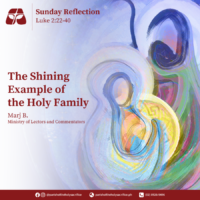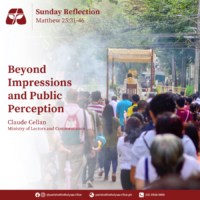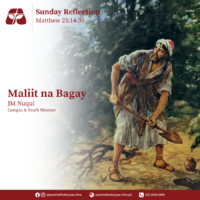Sunday Gospel Reflection
1st Sunday of Lent
Matthew 4:1-11 | February 26, 2023
Choices
T. Rex Paras
Ministry of Lectors and Commentators
We’ve already started our yearly observance of Lent. Last Wednesday, ashes were imposed on our foreheads to remind us that “[we] are dust and to dust [we] will return.” A similar reminder is given us in today’s First Reading (Gn 2:7-9; 3:17). The story of man’s creation is proclaimed to us. “The Lord God formed man out of the clay of the ground and blew into his nostrils the breath of life, and so man became a living being.”
Right after man and woman were created, their struggles with choices began. In the garden where they were, “the Lord God made various trees grow…with the tree of life in the middle of the garden and the tree of the knowledge of good and evil.” Of the fruit of the tree in the middle of the garden, God warned them, “You shall not eat it or even touch it, lest you die.” The choices were clear. Don’t eat the forbidden fruit: live. Eat the forbidden fruit: die. It was a choice between life and death. The man and the woman chose the latter. It’s too easy to dismiss the choice made by Adam and Eve as foolish. Between life and death, who, in their right mind, would choose death? However, most of the time, the choices are not that ‘simple.’
In the First Reading, for instance, the choices became complicated when the serpent came into the picture. The serpent obscured the choices first laid out to Adam and Eve. The other choice, when the serpent presented it, was no longer just death: “You certainly will not die! …the moment you eat of it your eyes will be opened and you will be like gods who know what is good and what is evil.” The serpent transformed the prospect of death and its drabness into an entirely new experience—one that is more exciting and appealing. It would be eye-opening and godly! Who could turn that down?
Like Adam and Eve, we all have choices to make. The salvation of all humanity may not depend on the choices we make, but choosing is no less difficult. Even in the mundane (e.g., deciding where or what to eat after mass today), it takes us some time to make up our mind, especially when faced with very enticing options.
In the Gospel (Mt 4:1-11), Jesus remained steadfast in spite of how enticing the devil’s proposals were. If we were the ones “fast[ing] for forty days and forty nights” and every fiber of our feeble body was shaking because of hunger and thirst, could we resist “stones becom[ing] loaves of bread?” The devil tempted Jesus thrice, but Jesus parried all three of them. Whether we admit it or not, we are not as successful as Jesus in warding off temptation.
For example, when fellow workers keep testing the limits of one’s patience with their self-aggrandizing comments and holier-than-thou attitude, it is very tempting to just tell them to shut up and get lost! Letting it all out seems satisfying. That would’ve been the easier choice, but what would that accomplish? Knowing the likes of such people, that won’t shut them up or make them get lost. So, what do we do instead? What is the other choice? What is the better (or best) choice?
The Catechism of the Catholic Church teaches us that when we are tempted, we turn to the Holy Spirit that makes us “discern between trials, which are necessary for the growth of the inner self, and temptation, which leads to sin and death.” Through discernment, we unmask “the lie of temptation, whose object appears to be good, a ‘delight to the eyes’ and desirable, when in reality its fruit is death.”
As we enter into Lent, let us pray for the grace of discernment to enable us to unmask the lie of temptation which lurks, too, in the difficult people we have to deal with.


